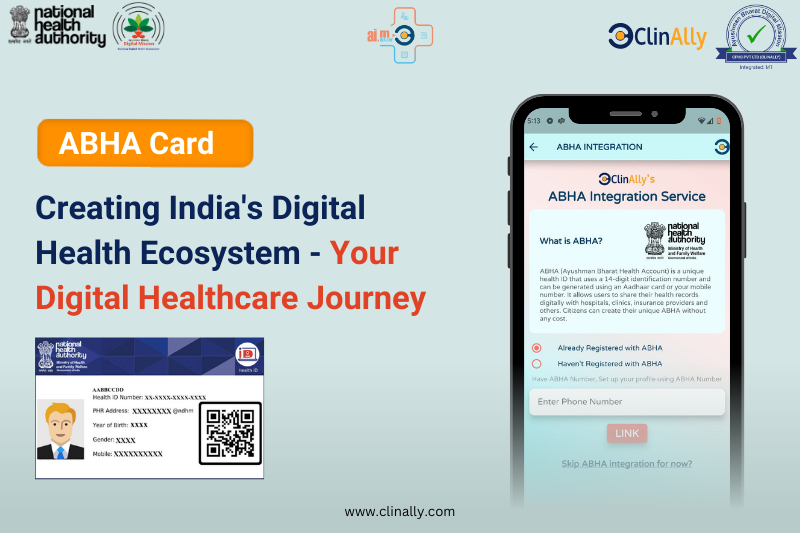ABHA Card – Creating India’s Digital Health Ecosystem – Your Digital Healthcare Journey

I. Introduction
Ayushman Bharat Digital Mission (ABDM) has launched recently to create India’s Digital Health Ecosystem. An integral part of the system is a digital account known as ABHA – Ayushman Bharat Health Account which will be an instrumental key to your digital healthcare journey.
What is ABHA card (health id)?
ABHA card is an integrated digital health card (health id) that has been developed by the Indian government to revolutionize healthcare services in the country. ABHA number is a 14-digit number that will uniquely identify you as a participant in India’s digital healthcare. It is an initiative taken by the government to provide citizens with access to better quality healthcare services at an affordable cost. This dynamic and comprehensive healthcare card (health id) is designed to connect citizens to health insurance providers and hospitals, thereby enabling them to avail better quality and cost-effective healthcare services. Similar to Aadhar card for national identification, this ABHA card is for medical identification.
Why is it important?
The primary aim of the ABHA card (health id) is to facilitate the timely and seamless delivery of healthcare services to citizens and tackle the endemic health problems facing India such as inadequate access to health services, poor quality of care and exorbitant healthcare costs.
II. Benefits of ABHA card (health id)
The introduction of ABHA card (health id) has a plethora of advantages for citizens.
Increased access to health services
Firstly, it provides increased access to health services across India. The card (health id) allows citizens to register for relevant health insurance plans and access insured hospital treatments that otherwise may be beyond their financial capacity or capacity for travel.
Improved Quality of Care
Secondly, the card (health id) enables access to improved quality of care due to its integration with electronic medical records, AI-enabled diagnosis tools, remote patient monitoring devices, and other advanced medical devices. This ensures that patients receive personalized treatments and care that are tailored to their individual medical needs.
Cost-Effective Care
Thirdly, the card (health id) helps in reducing the cost of healthcare through its ability to streamline transactions between patients, insurance providers, and hospitals. This ensures that payments are processed instantly, thus making it easier for hospitals to reduce their operational costs and provide cost-effective care to citizens.
Improved Health Outcomes
Lastly, the enhanced access to healthcare services and improved quality of care enabled by the ABHA card (health id) will result in improved health outcomes for citizens as they can now access timely treatments and diagnoses from qualified medical professionals.
III. How ABHA card (health id) works
Easy Registration Process
The ABHA card (health id) works through a secure system that connects users’ information to relevant hospitals and insurance providers. To be eligible for using the card (health id), citizens have to first register themselves through a simple online process on the ABHA website or mobile app where they have to provide basic information such as name, date of birth, address, phone number, etc.
Connectivity to Live Health Records
Once registered, users are issued a unique card (health id) number which can be used for availing healthcare services anywhere in India. The card (health id) also offers connectivity with live health records which allows medical professionals to instantly access patient information such as existing medical conditions, existing medications, allergies, etc ensuring that they provide accurate treatments and diagnoses.
Secure Transaction System
Furthermore, through a secure transaction system, payments between patients, insurance providers and hospitals are processed quickly making it easier for patients to avail cost-effective treatments.
Comprehensive Healthcare Services
Finally, through partnerships with healthcare organizations and providers, citizens registered with the ABHA card (health id) can avail comprehensive healthcare services ranging from diagnosis tests and treatments to consultations with specialists.
IV. Creating India’s Digital Health Ecosystem
- Setting Up a National Health Database
- Establishing Digital Health Platforms
- Partnerships with Healthcare Organizations and Providers
- Building Robust Technology Infrastructure
- Enhancing Data Security Measures to Protect Patient Privacy
- Improving Accessibility and Availability of Services
- Streamlining the Communication Channels between Different Stakeholders in the Healthcare Sector
For ABHA card (health id) and its potential benefits to be realized properly in India’s healthcare sector, it is essential for a digital health ecosystem to be created in India that builds upon the existing infrastructure of traditional health systems. To this end, various steps have been taken by the Indian Government including setting up a national health database where all citizens’ information is securely stored; establishing digital health platforms that enable easy communication between different stakeholders; forging strong partnerships with relevant healthcare organizations; building robust IT infrastructure; enhancing data security measures; improving accessibility and availability of services; as well as streamlining communication channels between different stakeholders in the healthcare sector. These initiatives combined with the introduction of ABHA card (health id) will enable India’s healthcare sector to become more efficient and deliver better quality care at an affordable cost.
V. Conclusion
Overall, the introduction of ABHA card (health id) has the potential to transform India’s healthcare sector by providing increased access to health services across India at an affordable cost coupled with improved quality of care and better health outcomes for citizens. To realize these potential benefits properly however it is essential that a digital health ecosystem be established in India through initiatives such as setting up a national health database, creating digital health platforms etc.
Once this ecosystem is in place combined with initiatives like ABHA card (health id) this will lay the foundation for providing improved medical care throughout India that meets international standards in terms of quality and affordability.



